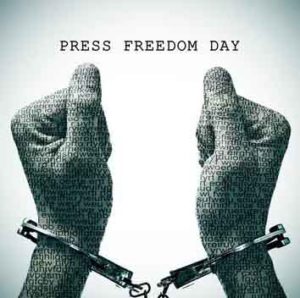By Rohit Chetri
 What is a free press? However subjective the answers may be, the essence of the same is not disparate.
What is a free press? However subjective the answers may be, the essence of the same is not disparate.
Free press, indispensable in any healthy democracy, has been time and again perceived differently — while Mahatma Gandhi argued that “Freedom of the press is a precious privilege that no country can forgo”, George Orwell believed that “Freedom of the press, if it means anything at all, means the freedom to criticise and oppose.”
As the world observes another year of World Press Freedom Day, Sunday Shillong brings to the table the ‘autonomy’ of the media and also gets in touch with Shillong-based journalists, seeking their take on the freedom of the press, which continues to remain a bone of contention in contemporary India.
 Worrisome Figures
Worrisome FiguresIndia ranks at a staggering 150th out of 180 countries, as per the latest data available on World Press Freedom Index, compiled and published by Reporters sans Frontières. As startling as the statistics might be, it is no wonder that the fourth pillar of democracy has long been subjected to tribulations in India. Instances galore to corroborate this contention — rise in hate crimes against journalists, blatant encouragement of antagonism towards media, use of stringent measures are just to name a few.
Alongside, attempts to suppress the media are not something unprecedented in India. Draconian laws to stifle the press have been wielded time and again — be it during the British Raj or during the Emergency years in the 1970s.
The question still looms whether the noose on the freedom of the press is actually being tightened in contemporary India? Are the voices of dissent being quelled? Is the media able to exercise its autonomy flat out?
 Journalists speak…
Journalists speak…Some pertinent questions were put forth by Sunday Shillong to select members of the media fraternity in Shillong, and they spoke.
Editor, U Nongsaiñ Hima, Andrew W Lyngdoh, feels that press freedom very much depends on whether one is with the government or against it.
“Press freedom has been compromised in this country — whether it was during the Emergency of the 70s or under ‘normal’ circumstances. Governments, at the Centre or in states, have used stringent measures to curb freedom of speech in the name of national security and threat to public order. The world wakes up only when arrests of journalists take place or when a media house is raided or served with notices. We tend to ignore the subtle forms of suppression that the press undergoes often. Those who differ from the government line get the stick; those who don’t are rewarded,” averred Lyngdoh.
He goes on to say that the working of the media has been complicated by post-truth politics.
 “There is a breed of journalists who not only bow down before the powers that be but are willing partners in furthering divisive, hateful and corrupt agendas. Television journalism has become a circus and a theatre of the most absurd where hate is openly promoted. But there are also irresponsible journalists who, in the name of press freedom, are nakedly biased towards certain political parties or communities disregarding truth,” Lyngdoh says, adding “Press freedom is being abused to suit agendas based on ideologies and personal regard.”
“There is a breed of journalists who not only bow down before the powers that be but are willing partners in furthering divisive, hateful and corrupt agendas. Television journalism has become a circus and a theatre of the most absurd where hate is openly promoted. But there are also irresponsible journalists who, in the name of press freedom, are nakedly biased towards certain political parties or communities disregarding truth,” Lyngdoh says, adding “Press freedom is being abused to suit agendas based on ideologies and personal regard.”Lyngdoh also thinks that in the next 10 years or so, there might not be any “press” per se but only “propaganda” machines of pro and anti-government.
Commenting on the press freedom ranking, Managing Editor of Batesi TV, Joe Thangkhiew says, “Yes, it has been compromised. Many journalists have been threatened, some even killed for disseminating factual information that is against certain groups, parties, or powerful (politically or otherwise) individuals.”
Bringing another contentious issue to the fore, Thangkhiew adds, “Under Article 19(1) (a) of the Constitution of India, Right to Information and the right to communicate the information via media is guaranteed but the sedition law does make reporting a bit scary and unsure.”
 Editor of Mawphor, Deimaia L Siangshai, on the other hand, contends that not only has the press freedom been compromised in India but, at the same time, the media has not been able to discharge its duty freely.
Editor of Mawphor, Deimaia L Siangshai, on the other hand, contends that not only has the press freedom been compromised in India but, at the same time, the media has not been able to discharge its duty freely.Siangshai is also uncertain about the freedom of the Indian press in the next 10 years.
Concurring with Siangshai, Senior Sub-Editor, Salantini Janera, Warmand R Sangma, says that the media persons in India do not enjoy freedom like their counterparts in the U.S.
“It can be seen that the media is not free to write against wrongdoings by the ones in power. Most of the time, media persons are attacked by unruly people — on many occasions, journalists are arrested,” Sangma adds.
Senior Sub-Editor, The Shillong Times, Sanjay Kar, on the other hand, feels that the press has not been able to freely discharge its duty since the last decade or so.
Kar elaborates, “Yes, the freedom of the press has been compromised to a certain extent but the press itself is responsible for the same. Freedom is hard to earn and harder to sustain. If one cosies up to those in power and try to earn their loyalties, then their freedom is definitely at stake.”
“Advertisements have dominated the news space and media is no longer unbiased and unapologetic. Business has taken precedence and real journalism has taken a backseat,” adds Kar. Agreeing with Kar, Thangkhiew further adds, “Money power also compels media houses  to take sides. They can’t sustain without advertisements. So, how free the media is, depends on how much money is being paid to be free.”
to take sides. They can’t sustain without advertisements. So, how free the media is, depends on how much money is being paid to be free.”
 to take sides. They can’t sustain without advertisements. So, how free the media is, depends on how much money is being paid to be free.”
to take sides. They can’t sustain without advertisements. So, how free the media is, depends on how much money is being paid to be free.”Kar also contends that it is the responsibility of the media to uphold its own freedom in the days to come.
Editor of Meghalaya Times, Daniel Dondor Nampui Majaw, believes that the “advent of public journalism” and the “proliferation of news” on social media augur ill for the freedom of the press. “The freedom of the press has been compromised in India and this is particularly applicable to the present situation in Meghalaya where press is prohibited to report on certain issues,” Majaw says.
He concludes by saying that non-adherence to journalistic ethics sometimes precipitates curbs on media.
A revisit
Raking up a contentious issue does beckon a reference to The Constitution, wherein freedom of the press has not been categorically mentioned; it is implicit under the Article 19(1)(a), which provides for the right to freedom of speech and expression. Also, it is not that there has not been any demand to make an explicit mention of the freedom of the press in the Constitution — there have been heated debates over the same in the Constituent Assembly during its making.
However, it was chief architect of the Constitution of India, Dr. Bhimrao Ramji Ambedkar, who put an end to the bone of contention when he, in the Constituent Assembly, argued that there should not be a separate mention of the freedom of the press in the Constitution as media is just another method of quoting an individual, and when anyone chooses to write in a newspaper, they are merely exercising their right to express.
The exigency
Needless to say, free media is a sine qua non for India — it not only acts as a check on the government and its administrative agencies but also brings the social, economical and political ills to the fore, makes the citizenry au courant with burning issues, gives a voice to the voiceless, thereby bolstering the sovereignty and integrity of India.
For what it’s worth, concerted endeavours are crucial for the safeguard of the fourth pillar of democracy which is as weighty as the Executive, Legislature and Judiciary.



